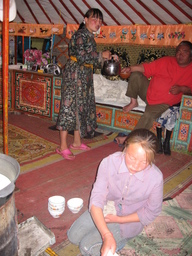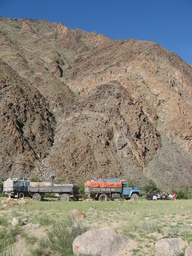
Inside a Yurt
 Inside a Yurt |
I've made it to the border between Xinjiang and Mongolia.
From Ulaangom Meenday and I continued on with our 76-year old Jeep driver to Khovd, a small city in the south west. He stayed on in Khovd, we were lucky to find a van departing for the border that afternoon.
The ride to the border was one of the worst rides I've experienced. To set the tone, it left several hours after all the passengers arrived. Delays are the norm in Mongolia, so I wasn't bothered by setting off late. What I found frustrating were repeated breakdowns and the uncomfortable nature of the van's interior: there were no seats inside. The journey was supposed to take ten hours, which would have been arduous enough. The breakdowns turned it into a multi-day event.
Fourteen people and their baggage were crammed into the back of the van. There were a couple of traditional Kazakh carpets--shydraks--on the floor but nothing else. People sprawled out over bags, boxes, and each other. It took over 24 hours of bumping along to finally make it to Bulgan, the last stop before the China border.
At least some of the delays allowed opportunities to connect with the local culture. Most of the nomads in this area are ethnic Kazak, rather than Mongolian. The hospitality remains the same across the two cultures, though. Every time the van broke down, passengers would wander over to the nearest yurt (ger). Each time, over a dozen unexpected guests would be welcomed inside and allowed to pass a few hours wawiting inside around the fire. Milk tea and dried cheese would invariably be offered.
Getting to know the other passengers, I found that many of them were not intending to stay in China. Over 90% western Mongolia's population is ethnic Kazak; most fellow travellers were transiting China en route to Kazakhstan. Mongolian passport holders do not require a visa to enter China; going via Russia would require a transit visa. The road is long, difficult, and requires going through a third-country, but was simply the cheapest way for most locals to visit Kazakhstan.
Reaching Bulgan was a relief. No showers were available, but there was a basic hotel. Bulgan itself was pleasant, largely owing to a real, paved road extending through the city and 60 kilometers beyond. The road must have been built by Chinese workers, I haven't seen a similar road elsewhere in Mongolia.
 Tea Break beneath Altay Mountains |
I don't blame being turned back on Meenday, but wish she hadn't decided to give explanations when the officials started scrutinizing my papers. It might seem natural that she, who could speak the language should be the one to reckon with the situation. I could tell though, even without speaking Mongolian, that she was saying all the wrong things.
The offficals were resistant to letting me out, but kind enough. I killed time chatting with a couple people working at the border. One of the Mongolian intelligence officers spoke basic Chinese, a born-again customs officer spoke fair English. There wasn't much else to do anyway. To get the official word, I had to wait seven hours for the head officer to return from a visit to the Chinese side. When he finally did return (and denied me passage) he helped me get a lift in a convoy of cargo trucks heading up to a small city in far-western Mongolia, Bayan-Olgii.
Holding a Chinese passport, Meenday was allowed passage and had crossed back into Xinjiang several hours prior. I resigned myself to a long detour. I was initially apprehensive about spending another week in Mongolia, now I'm pretty charged. I'm riding in a convoy of Kazak traders transporting goods from China. The distance is short, only 500 km to Bayan-Olgii, but a 2-day journey. Several times various traders have said, "This is the most difficult, worst road in the world," without any sense of irony. Given what I've seen so far, they may well be right.
We've stopped for the night, at the moment I'm in a yurt with four Kazak traders, drinking tea. I've found that with patience and repetition our communication level is fairly high. I speak in Uighur, they respond in Kazak. The present plan is to make it to Bayan-Olgii in two days. I'll stay three nights, there are flights every Wednesday to Oskemen in eastern Kazakstan. Oskemen is not far from another border crossing with China, Gemini. Hopefully I won't be denied once again--the Gemini crossing is not supposed to be restricted to travellers with western passports.